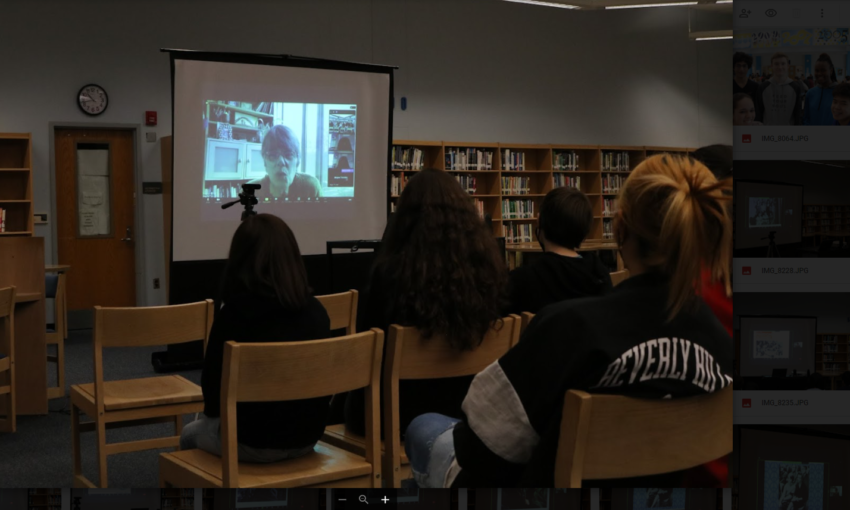By Chloe McGeehan, The Current Managing Editor
Mary Beth Tinker, an American free speech activist known for her role in the Tinker v. Des Moines Supreme Court case, joined River Hill High School over Zoom on Wednesday February 23rd, 2022 to discuss her experience advocating for youth rights and emphasize the importance of young voices.
The room was buzzing with whispers of excitement and curiosity as Mr. Parish connected to the Zoom meeting, a platform that would bring his 4B class face-to-face with an American historical figure. Mary Beth Tinker was just 16 years old when she stepped foot before the Supreme Court in 1965 to defend herself and the four other students at Warren Harding Junior High that were suspended for wearing black armbands to school in protest of the Vietnam war.
The school board had caught wind of the students’ plan to wear arm bands and passed a preemptive ban in response. Ms. Tinker reports that “[The school board] called this hasty meeting in secret at a hotel. The press… some journalist found the meeting…and what was going on, so it had been in the Des Moines register that there was going to be this rule against arm bands, black armbands. The ACLU found out that way.” The ACLU or American Civil Liberties Union was founded in 1920 to fight for freedom and the protection of our United States constitutional rights.
Represented by the ACLU, Mary Beth Tinker, John Tinker, and Christopher Eckhardt embarked on a four-year court battle that culminated in the landmark 7-2 Supreme Court decision ruling that neither students nor teachers “shed their constitutional rights to freedom of speech or expression at the schoolhouse gate.”
But rather than starting with the decision, Ms. Tinker began her conversation on Wednesday with childhood reflections. “I was raised to speak up about things, for one thing my dad, he showed us the example of how to put your ideas into action.” Her father, Leaonard Tinker, was a Methodist minister who lost his job in Atlantic, Iowa after defiantly challenging their local swimming pool facility on their “no blacks” rule. Ms. Tinker learned from her father to stand against injustice, saying “I have to live my values. That’s how I was raised.”
The family then moved to Des Moines, Iowa near a different church “where we saw these amazing kids on the news…By then I was 10 years old in 1963…These kids were the Birmingham children’s crusade—the amazing group of students who spoke up and used their first amendment rights to speak up about racial injustice.”
However, tragically on Sunday, September 15, 1963, a bomb detonated at the 16th Street Baptist Church in Birmingham, Alabama. The explosion, which killed four young girls, occurred after a federal order came down to integrate Alabama’s school system. During this recap Ms. Tinker poignantly added, “these violent people that believe white people are better, they do have a flag [the confederate flag] to represent their abuse which explains why it is so emotional.”
In response to the traumatic event, black armbands, a national symbol expressing sadness and grief, were worn to mourn the little girls. Ms. Tinker was one of the people to wear a black armband; however, they didn’t wear them to school. The Birmingham bombing brought the reality of the tumultuous 1960s to Ms. Tinker and many kids around the nation. Human rights became a conflict that kids not only saw, but were touched by.
When Larry Burrows (a famous Vietnam war photographer) and television broadcasting networks made military exploits in Vietnam public, Ms. Tinker took a page from her father’s book and refused to stay silent. Ms. Tinker remarked, “We were seeing these things on the news, we got sadder and sadder about all this, and we heard about a plan to wear black armbands again. This time not for the Birmingham children, but for the war and to say that we were mourning the dead in Vietnam on both sides of the war. To say they should have a truce that Christmas and negotiate.”
Before branding the black symbol, Ms. Tinker went to a school board meeting in an attempt to overturn the rule against arm bands; however, the school board wouldn’t change their mind. Neither did Ms. Tinker. As a result, she was suspended in 8th grade.
With the school board’s unyielding adherence to their rules, the only way to combat her suspension became court. “You know how people love to say kids are the future, well yeah, but actually kids are the present. You’re here. Right now. Today. You don’t need to wait to get started.” Ms. Tinker’s powerful words come from a childhood of strength and resilience. At just seventeen years old, a junior in high school, she traveled to Washington D.C. to stand before the Supreme Court of the United States.
However, Ms. Tinker vulnerably shared, “I was really really shy for a long time about [her involvement in the case]…when reporters would talk to me, I would just like ‘oh talk to the older kids’….Youth unfortunately have been a group that has been discriminated against, so you have to use some tools to change then and one of the great tools you have used and are using….[is] the first amendment.”
Ms. Tinker elaborated that the Tinker v Des Moines 1969 decision “was a big deal, because before that it was pretty much thought that administrators, school boards – mostly [school boards] – could decide what you talked about in school.”
After the decision, Ms. Tinker mentioned, “I had to grapple – like all of us do – with how to make a contribution. What was my role? How could I use my experiences, passions, talents, whatever, interests…to contribute?”
She found her way to nursing school where she gravitated towards working with kids and teenagers. She became a trauma nurse, picking up the pieces of policy that fail to protect youth such as unrestricted gun laws. Ms. Tinker continues to educate young people about their rights, speaking frequently to schools across the country, like River Hill!
River Hill students this article is a reminder that your voice matters! Ms. Tinker calls us to action, “Its a time to step up…step up about what we want our society to look like, what we want our world to look like. Its kind of mighty times again, like it was then.”

